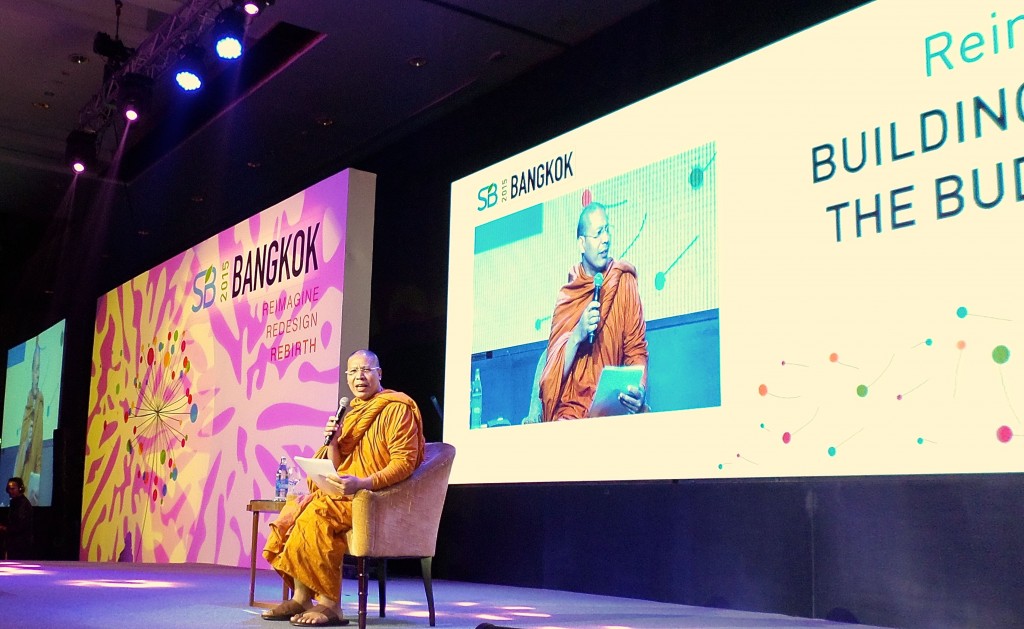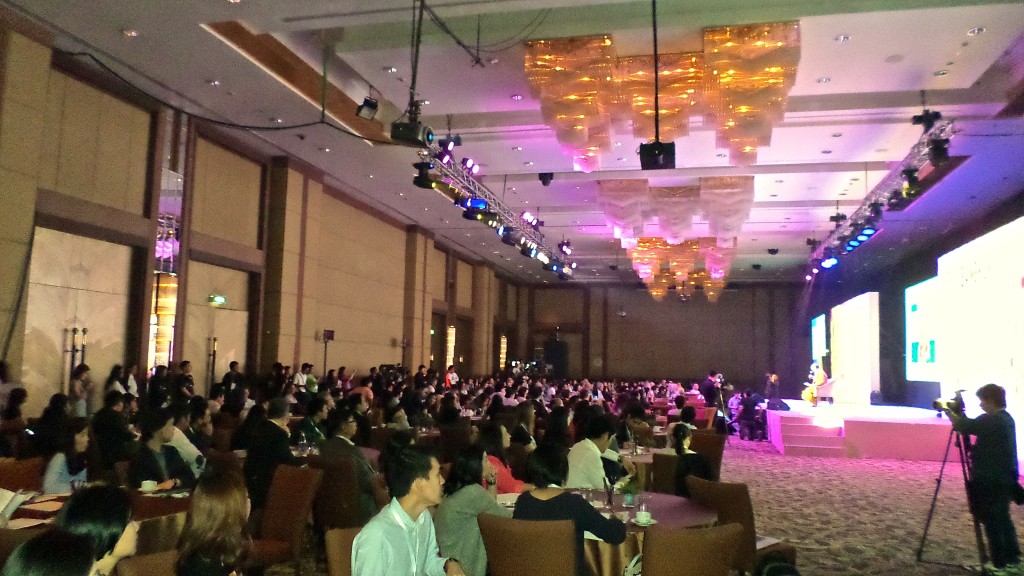
20 Mar, 2015
Buddhist monk shames branding gurus: “Are you really contributing to sustainability?”
Bangkok, March 28, 2015 – Thailand’s leading branding gurus got more than they bargained for at a conference on sustainability when the keynote speaker, a prominent Buddhist monk, ripped into the human frailties of greed, pride, egotism and conceit, all of which he said help meet corporate goals but are totally opposite to core Buddhist concepts. He compared ecological and environmental problems to obesity, saying both were caused by “growth” of the wrong kind.
 Venerable Dr Phra Shakyavongsvisuddhi (aka Phra Anil), Deputy Rector for Foreign Affairs of Mahamakut University |
 |
In a shock-and-awe statement at Asia’s first “Sustainable Brands 2015” convention, Venerable Dr Phra Shakyavongsvisuddhi (aka Phra Anil), Deputy Rector for Foreign Affairs of Mahamakut University, said, “Generally, Buddhism and business are two opposite sides of the story although both begin with the letter ‘B.’ Buddhism is all about reducing greed while business is all about indulging greed! Therefore, I don’t see any similarities between my goal of disengaging myself with my desire and your goals of promoting your desire as well as doing everything within your power to enhance desire of others even by all means of false branding and cost of advertisement.”
Stressing that “the way we perceive world need to be changed,” he said that “we are trying to rectify our mistakes from the past which was left to us by our ancestors. We recognised the bad policies our predecessors took which in result causing depletion of resources, problem of population and creating pollution. … What are we going to leave behind for our future generations? Are we going to leave same idea, philosophy and problem just as we have received from our ancestors as their legacies?”
His most signature comment was reserved for pinpointing the difference between western concept of sustainable brands and Buddhist brands. “While western sustainable brands only emphasise on external factors of economy, environment and society, the Buddhist sustainable brands look at holistic, integrated and balanced factors of human development to go hand in hand with sustainable development. This human cum sustainable development is only possible through the full process of human development. It can be developed by relating wisdom and ethics through mental qualities. In another word, how we relate reimagine and redesign through rebirth.”
The signature event was organised by Thailand Management Association (TMA) in collaboration with Thailand Convention & Exhibition Bureau (TCEB) under the concept “Reimagine, Redesign, Rebirth”. The official statement said it was attended by “brand and innovation professionals from around the region to exchange their knowledge in building better brands by embedding purpose-driven environmental and social innovations into their businesses so that sustainability becomes a core driver of business and brand value.”
In her opening remarks, Mrs Ko Anna Vikoren Skrzyniarz, Founder and CEO, Sustainable Brands, also expressed some misgivings about the state of the world. Now aged 56 and a mother of two sons, she said had been through a long professional career. “Yet at some point in my life, after two decades of business I became aware of the fact that all those skills and disciplines that served us well in the 20th century, are no longer serving us. We need to rethink the way this works.”
The Sustainable Brands conference itself had started in 2007 with only 225 people and has been held around the world and now attracts a million people. The world’s biggest brands are involved. She felt that businesses were well-placed to lead the drive towards a sustainable economy and a flourishing future so that they may no longer been seen as villains but heroes. “Business as usual is not sustainable,” she said.
On one hand, governments all over the world are struggling with multiple problems, including the U.S. where “there is a lot of tension, discord and gridlock.” Secondly the value of branding as a tangible asset has grown. Intangible value such as reputation and confidence in the long term success of companies has become a much more significant part of the value. “Brands are the center of the ecosystem of our economy. Brands dictate use of business resources, and have the capacity to change societal aspirations and norms and expectations.”
She said it is becoming important to redefine what is a brand — that it is not just a mark or a tagline but reflects who you are and what you do and why and how you do it and how you present yourself to the world. “Sustainability has been primarily seen as an environmental issue but eventually it is about people and creating an environment for the flourishing of humanity, for your children and grandchildren. That is what is uniting the conversation around the world. We care about the world and our individuals.”
She said that as this was the first time this event was being held in Asia, she was mostly going “to listen and to learn. I have been incredibly humbled by the goodwill shown to me since my arrival. And I am looking forward to taking back to the rest of the world what I have learnt from you.”
Phra Anil gave her a lot to learn, think and take back. In fact, he effectively told her and all the participants that the way global commerce and economic systems are structured, there is no hope for achieving sustainability under the current business models. If they truly want to re-imagine the way business is done and walk the talk of sustainability, the 2,500-year-old teachings of the Lord Buddha and the speeches of King Bhumibhol, the world’s longest reigning monarch, would be a good place to start.
Click here to download the full text of his speech. Although the speech as prepared for delivery is somewhat pedantic, Phra Anil deviated from it regularly to express himself in layman’s terms. That is when he was at his best.
He began by urging the business leaders to leave their “anxieties, expectations, worries” outside the hall and focus on their inner self, take deep breaths and think of their body. The very foundations of sustainability lie within each of us, he said. Try to understand who you are, and enjoy the bliss that results. “Whatever you think of business and brands and way of life, it is only important and has value because you are somebody and connected in this world with someone. Only if we appreciate that connectedness, that it becomes valuable to live together and create a new world, peace and prosperity.”
He made clear that he saw no similarity between the world of business and the Buddhist faith. Buddhism means having to disengage from all desire, which is totally opposite of business. To succeed in business, you are supposed increase and improve greed. Your task of business is trying to enhance and improve that greed to others so that they can be happy with fulfilling that greed. These two polarisations — how they come together I have no idea.”
In a remarkably thought-provoking speech, he added, “From a western point of view we think that human need, greed, conceit, hatred is a part of who we are. It is a golden blessing. That is what makes us human. In order to compromise, we have to reduce our greed, our hatred, our conceit. It’s (all very well) for monks to say it. But in real life, can you reduce that? If you reduce demand, desire, your business will collapse. Business is about increasing greed, and other people’s greed. When greed is increased, your business succeeds and that’s why you need successful branding.”
He compared the whole concept of growth to the global obesity crisis, saying: “We have to look our world in a new way. Because the old way, it’s become a problem. When we think about survival and business, we consume a lot, we forget to think of others. We have ‘developed’, become so big and bigger just like obesity. It is the obesity of egos and desire. That’s we have never have the word ‘enough’. But now we have to think ‘enough is enough’. Not having ‘enough’ in our brain system and imagination — that’s why our environment is depleting, our environment is degrading and our society is getting worse and worse and we are unable to live happily. We are trying to imprison ourselves in our homes hoping that will be the most safe place to live. But there is no safety and security anywhere.”
Declaring himself “allergic” to the word sustainable, which he referred to as a mere “mantra on an altar,” he urged participants to heed the principles of the Sufficiency Economy and Gross National Happiness, both of which are grounded in the same principles, the same idea, the Buddhist middle path.
“The idea behind sustainability or ‘sufficiency economy’ is to be mindful of all foreseeable and unforeseeable consequences of human actions. ‘Sufficiency economy’ is not anti-globalisation, antimega-projects and anti-liberal market policies at all as some may think in that way. On the contrary, sufficiency economy encourages us to wisely ruminate on over all aspect of globalization, megaprojects and liberal market policies instead of just aiming at one dimensional consequence. Sufficiency economy produces a well-balanced physical and mental development. After all, the essence of man is the integration of body and mind therefore the development should be based on balanced consequence of both physical comfort and mental happiness. A proper application of sufficiency economy teaches us to be responsible for projects and policies whether it is a global, national, organisational and individual.”
He also cited the Islamic concept of Halal food as an indicator of the fact that the roles of culture and religion cannot be ignored by business. “Halal is not just foodstuff. Nowadays all goods need a halal branding, if you want to expand market in Islamic countries.”
Read the speech in full. For those who enjoy alternative perspectives and thinking a little more deeply about issues, it will prove to be a game-changer.



Liked this article? Share it!